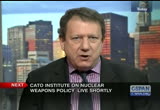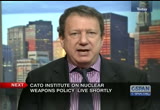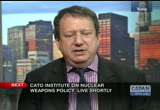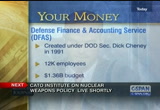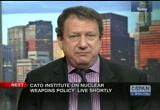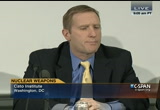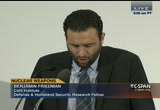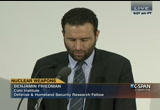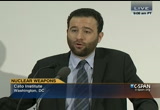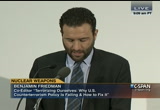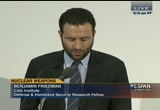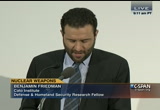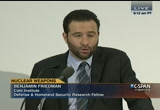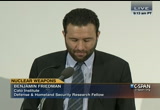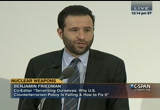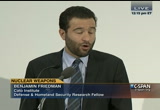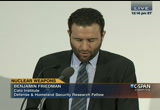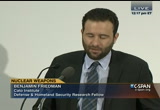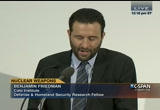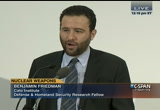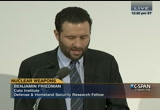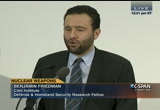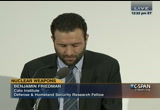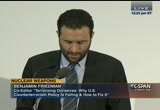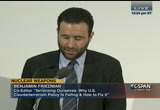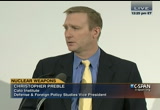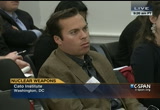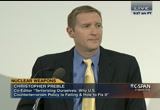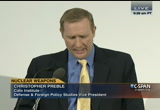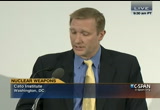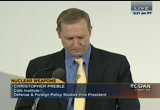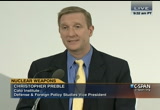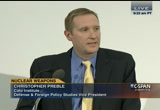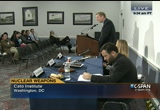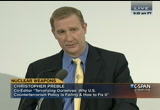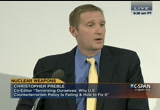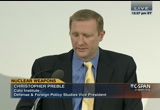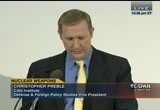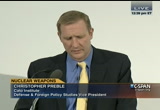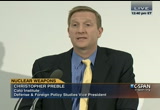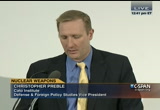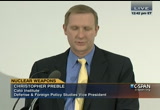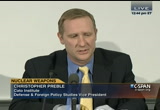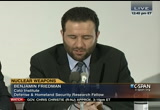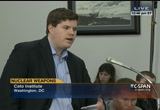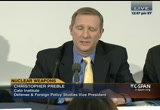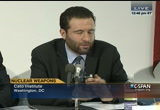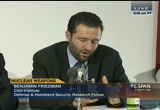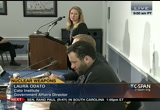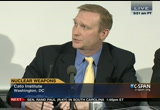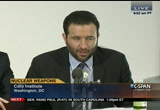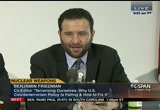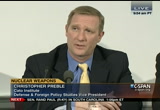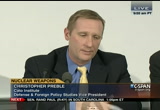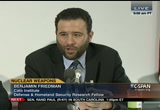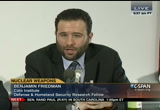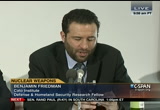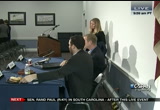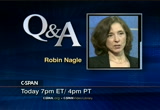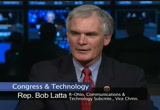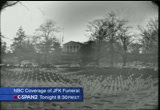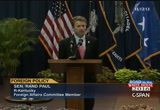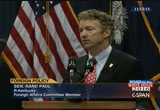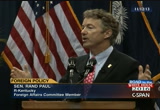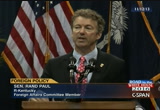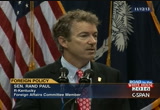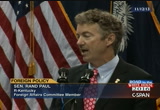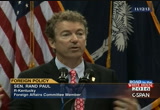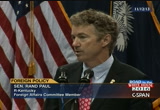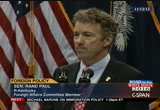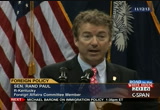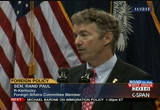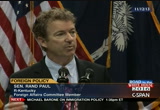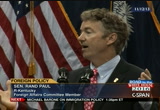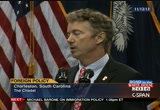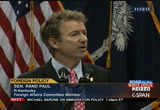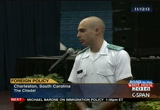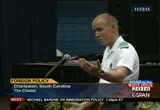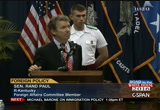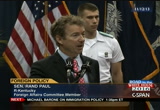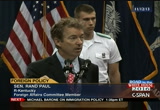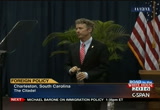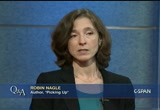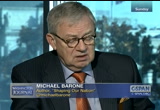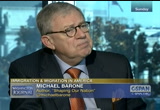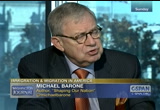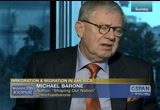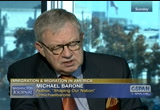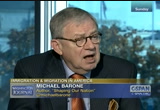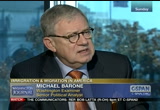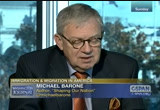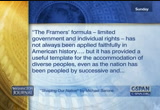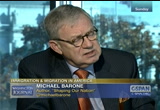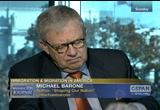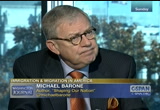tv Key Capitol Hill Hearings CSPAN November 25, 2013 12:00pm-2:01pm EST
12:00 pm
-- for illegal uses. that can include outright fraud at best or it can include -- the u.s. house has the very strict used than what it was appropriated for by congress. violation of that can entail civil and criminal penalties. because the accounting is so opaque, it is impossible to tell whether there are anti- deficiency act violations and perhaps whether they are even widespread. that perhaps is a reason over the long haul that there has been resistance tearing up the accounting, because often it is experience -- it is expedient when money is needed to finish revamping a helicopter or installing something on a ship, they just can't immediately take money from the wrong account -- they just immediately take money from the wrong account and spend it on that. host: one of the key quotes in your piece is by then secretary
12:01 pm
of defense robert gates -- "my staff and i learned that it was nearly impossible to get accurate information to questions such as much money did you spend and how many people do you have." secretary robert gates in 2011. a c-span democrat on twitter asks, "is there some a slide on which the dod can begin a comprehensive accounting? how would they audit this behemoth, 40% of the federal budget?" guest: that is an enormous problem. when you have a baseline, you have to have a starting place. the records are so screwed up, they do not have that. most of these systems have existed for years and years and had data put into them manually, people putting in long alphanumeric strings of code, and of course people made typos
12:02 pm
and that means the data disappears or is erroneous. there is no way of knowing where the defense department is today. one way they are trying to get around this, they were supposed to do a big audit after 2014, a big chunk of the pentagon's accounts, and they are scaling it back to the current year rather than money that is appropriated for previous years because they have no record of what happened to the money from previous years, or a very incomplete record. host: some stats from scott paltrow's story, created under former secretary of defense dick cheney in 1991. has 12,000 employees and a $3.6 billion budget. it is responsible for paying active-duty soldiers and
12:03 pm
contractors and it made 17 $617 billion in payments in 2012. that responsibility for paying active-duty and reserve troops was the result of your first report in the "unaccountable" series you have been writing. what you find in the july story? >> we found this was a particular instance of a larger thing we have been talking about. military payroll as well as payroll for civilians is handled at dfas on amy sheen that runs -- from a machine that runs from cobol and has not been updated since the 1970's. there was a plan to replace it. it makes a lot of errors and it makes it difficult to keep track of things. especially when a soldier is
12:04 pm
moving from one unit to another or has been injured and transferred home. we have found some harangued us examples of wounded warriors, people who have been blown up and suffered serious injuries in iraq and afghanistan who are hospitalized more than a year and maimed and came back to the states thinking that all their finances would be taking care of and discovering that by mistake they have been completely cut off by dfas. host: who is sean aiken? guest: he was an army medic, a sergeant who enlisted in iraq we believe the conversation here. live now to the cato institute about a discussion about the u.s. nuclear policy. they just released a paper about the rationale for the current policy and why it is outdated. discuss their
12:05 pm
findings. speaking now is laura odato of the cato institute. first up is ben friedman, a research fellow at the homeland security studies. his expertise is counterterrorism and defense policy. he is the author of dozens of articles and the coeditor of two books. he is a graduate of dartmouth college and a phd candidate of political science at the massachusetts institute of technology. also with us is christopher preble. before joining cato institute in 2003, he taught school at st. cloud university. he was also the commissions officer in the u.s. navy. holds a phd in history from temple university. now i will turn things over to
12:06 pm
ben. thanks, everybody, for coming. i will talk about the historical part of this. if you are interested in the policy part, you can take a net - nap and wake up for chris' section. u.s.rgument is that security does not require a triad of nuclear delivery submarine-bm's, launched ballistic missiles, and bombers. in fact, we should only keep a small amount of submarine missiles. for a think tank paper, this is an historical argument, especially its attention to the and hows about the u.s. we justify nuclear weapons. we show in the paper the triad was a result of competition both
12:07 pm
with the soviet union and among the u.s. military services. the reasons we hear for the triad are more rationale than justifications rather than causes. we looked at how those arguments became reaffirmed and due to scrutiny in competition, even though there are always shaky foundations eroded. before i get to that history, our argument is based on economy, not on the changes in u.s. foreign policy that chris and i advocate elsewhere. while we would like to defense with many of the alliances and theions that create requirements for current military and nuclear force, the argument here is that we could -- even if we cap those -- you can keep your
12:08 pm
hawkish alliances even more hawkish than today and still agree with our proposal. that is because of the capabilities that are missiles now have. to the history. the origins of the triad came in the 1950s in the eisenhower administration. u.s. defense strategy at the time was to defend allies and western germany with mass the response to the unpopular korean war. the new look said, we missed attacks will be met with overwhelming nuclear weapons response, which at the time would be delivered by air force bombers under their strategic command. that strategy sought to take advantage of the u.s. nuclear monopoly and superiority to save money. to be the thought cheaper alternative to ground forces, more bang for the buck.
12:09 pm
this was an air force-led strategy. force sharehe air of the budget approach 50%, a 20% increase roughly that came at the expense of the other services. missiles then changed things. fission had allowed the development of thermal nuclear weapons, which would increase their yield, which would allow warheads small enough to fit on ballistic missiles. this would then reach intercontinental range and would overcome any air defense system we had. soviets by then had developed the bombers that could fly, albeit one way, to the u.s. to deliver nukes. they tested thermonuclear hydrogen bombs. in 1957 with sputnik, they showed us what u.s. intelligence already knew, that they were
12:10 pm
developing these missiles, the ability to carry these warheads. the concern of the day was that u.s. nuclear weapons forces might be vulnerable to attack from soviet bombers or from icbm's, which could allow the soviets to disarm the force on the ground. this was the fear that gave us the bomber gap in the 1950s, the late 1950s.in the both proved not only to be wrong, but backwards, and that there was a favor for the united states in both cases. nevertheless, this created public alarm that are sure the eisenhower administration into spending more on defense, especially ballistic missiles. you have this situation where the army, air force, and maybe are scrambling to develop ballistic missiles programs.
12:11 pm
after years of bureaucratic competition, two programs as the arsenals mainstay. navy's polaris submarine missile, deployed at the end of the eisenhower administration, and the minuteman icbm, which became active the next year. --h paul harris, the navy argue thate navy their system was far more economical than icbm's or bombers. building at sea men that you did not need to buy more to make them defensible. you avoided that arms race but maintained deterrence. having accepted that they could not control to, with ad rationale for why keeping icbm's
12:12 pm
and bombers was necessary. in theund that rationale work that the rand corporation was doing sponsored by the air force. even if you solved the survivability problem, the soviet arsenal threatened the presence in europe. once you are in a situation of mutually assured destruction, defending europe became suicidal. if it was suicidal, it was not rational. if it was not credible, it would not deter. checkmatede, they each other. we could not stop them from marching into europe. the airtion at rand and force was a disarming first strike. you had to keep the ability to destroy soviet forces, and you
12:13 pm
do that by concentrating your fire on those forces, with accuracy. a disarming first strike against their forces but leave their cities unharmed. that was called counterforce. by hitting the forces, you limit the damage they can do against your attacks. by leaving their cities unharmed, you make them into hostages and encourage restraint amidst more, either halting their attack or sparing u.s. cities. to the air force, this doctrine has the effect of carving out a niche. could targetm's most soviet missile silos. and bombers, they said, would carry the warheads powerful and accurate enough to hit hard silos or deeply buried targets.
12:14 pm
were essentially invulnerable to attack but an accurate, they were thought to be perfect for holding in .eserves those soviet cities so you have this division of labor that redefines the status quo. administration, upon taking office, embrace the strategy. administration had blasted the retaliation strategy from eisenhower, and they needed something new, so this is how they would improve on matters. in the defense department, they hired a lot of the rand analysts who have developed this thinking. it would have been a brutal fight for the administration on the hill to kill a leg of the s.iad, so it became their once you testify before congress
12:15 pm
on the systems, even if you do not want them, you have to make arguments for them. fourth, the strategy was a way to keep west germany from getting nukes. this worried the soviets so much, this began the berlin crisis to prevent that. andway to settle the crisis keep the germans satisfied under the u.s. nuclear umbrella was this strategy to say, don't the ability to use these weapons to defend you. but the trouble with the counterforce. ,s that it has no upper limit so as the soviets build more missiles because of vulnerability, you build more to respond. the secretary of defense quickly realize that trying to maintain disarming first check capability
12:16 pm
against the soviets as they build more, you would be giving a growing share of the gdp to the air force. so within a few years he changed his mind and band counterforce argument. a it was not allowed in such documents. pentagon came up with a plan that talked about a second strike. each triad leg was supposed to have enough to dissuade the soviet union from fighting, do enough damage where they would be deterred. justifyingup being the force that mcnamara had. it was a way to say stop building more, let's just post where we are. so the arsenal was officially not meant to get us out of mutually assured destruction. it was meant with a
12:17 pm
survivability rationale. that sold better in public than the counterforce argument because it seemed to prudential. this remains the standard public personnel -- rationale used by public officials to explain deterrence. this remains the case. it also remains the case that this embraced rhetorically of cisco -- survivability, did not change the weapons. maybe because of unstoppable technological momentum, continue to make the missiles more and more accurate, to design the warheads in a way where they were optimized to go after enemy silos. meanwhile, the kennedy and johnson administrations did little to change the operational plan for using nukes to shift.nt any doctrinal
12:18 pm
they basically kept the plan they inherited, which was the massive retaliation plan. in a sense, the pursuit of survivability was always just the public story that covered the preemptive counterforce strategy. that has been the case for the history, really, of our arsenal, starting in the kennedy administration. even the counterforce preemptive story is not totally right because the united states, for the duration of the cold war, never invested enough in first- rate capabilities where we would have enough. we had stories about how we might deter the soviet union, but we never spent enough where it looked like a serious attempt to keep first strike capability, we never adopted civil measures
12:19 pm
that would allow us to survive. and air force could try for a first strike capability but within strict fiscal and political limits. in planning for this, we essentially started a nuclear war, that we safely thought we could start one. maybe we were a little bit crazy or that we believed in our own theories, which was enough to deter them. ann we wind up is underfunded first strike, counterforce, built around the triad, which is justified by a second strike of survivability rhetoric. it is a rather odd thing. because it hadns no enemies after the early
12:20 pm
kennedy years. the air force and navy learn to cooperate in response to what they saw as the domination of their budgets. because of the equalization of their budget shares, which cap member moved, incentive to go after each other's arguments. even the arms control community was more interested in promoting weapons survivability than pointing at the triad's access. so we are in this situation for a long time and to an extent defensewhere no big community has incentive to point out the triad is a wasteful excess. so the debate about nukes intensifies at the end of the allowed the declining logic of the rationales to the triad to survive scrutiny.
12:21 pm
survivedl myths appropriate scrutiny. one, that the survivability of the arsenal was in constant doubt in the cold war. it was not. the soviets never had the ability to track our summer rains, let alone have a first strike against our icbm's. that remains the case for all enemies. second, submarine counterforce improved to the point where by the end of the cold war, they were more accurate than icbm's. the navy suppressed that information because of its relationship with the air force. third and most important, the problem that our force was meant to solve, the difficulty of determining a soviet invasion of western europe, was wildly afterrated, particularly 1963 after the berlin crisis and
12:22 pm
the cuban missile crisis. 1960s, people noted that the soviets did not seem interested in conquest of western europe, that they were opportunistic to spread communism, but not at the cost soviet archives now open, we know that many of the leaders were deterred by the prospect of conventional war. iild war i and world war were not things they were willing to repeat. at the time noted, the conventional balance for most of the cold war was much more favorable to nato than conventional wisdom would have it. we now know the soviets did not think about nuclear deterrence like rand analysts.
12:23 pm
they saw war as eisenhower did, as something that was unmanageable and uncertain. they were not interested in fighting a war under the nuclear umbrella because of some difference in u.s. targeting policy. they were deterred regardless of the particulars of how we outlined our force. whatever they said, u.s. leaders behaved as if they agreed, in the early cold war and the beginning of the cuban missile crisis, when the u.s. had a better chance of applying a first strike and after. we were not able to coerce the soviets without diplomatic concessions, as was the case it with the cuban missile crisis. the whole irony then was that both sides were so frightened to restrain they were afraid to admit it for fear of emboldening the other. so there was this cold war
12:24 pm
debate about nukes. hard-liners in the u.s. insisted these were necessary to preserve the peace, while arms controllers argued that those steps pushed the doomsday clock closer to midnight. both sides shared the perception peace was was -- possible. the second strike survivability of the u.s. arsenal was never really in doubt, never has been. counterforce was over killed when it came to achieving extended deterrence. the triad was not necessary to counterforce. you can have a counterforce- centered force. over to chris.
12:25 pm
>> thank you, everyone, for being here. i should also thank the sponsors for their support of this research, which has been ,rucial, a two-year project subsequent talks around the city and the country, have been supported by their help. i want to thank them. the point of this research is to shine a light on some debate that did not get a lot of attention during the cold war, and it really obscured some of the flaws of the triad's rationale, and limited debate today threatens to do the same. our argument is, let's have a debate and test some of these tired, old rationales. to several ofd them and i want to go into more detail. he survivability rationale always required a healthy dose of paranoia. argue the cold war, they
12:26 pm
typically that the soviets had a first strike ability against land forces or were close enough to try, to blackmail us with the threat of trying. this under ended -- underestimated the u.s. and overestimated soviet production. defenders, those who argued about the necessity of bombers, argued that we ought to rely -- that reliance on submarines may start a war and we would be full of -- foolish to count on them if land forces were vulnerable. we should point out u.s. ballistic missile submarines grew quieter with each generation and the breakthrough was never close. immediately after the cold war, the gao found u.s. submarines were even less susceptible to
12:27 pm
detection than we had thought. other hawkish analysts thought were too accurate for anything other than strikes against cities. this was also incorrect. slbm's could perform counterforce missions. we now know they had a role almost from the beginning. then with the deployment of the d5 missiles at the end of the cold war, made did and still do have a better target capability than either air force alternative and comparably reliable communications. that was another significant improvement from the early polaris missiles. so the claims about accuracy are also incorrect. i think we should have a separate debate about whether accuracy is actually crucial to counterforce. for what it is worth, soviet leaders never indicated that
12:28 pm
u.s. deterrence success hinted at counterforce targeting, again for the reason that bend alluded to. we now know more about the nuclear doctrine from the soviets than we did even at the end of the cold war. of thecold war case triad had aged pretty badly. weapons haveuclear grown less important to u.s. security goals. that is one of the reasons why we believe it is hard a submarine force can accomplish those missions that nuclear weapons are meant to serve, mainly deterrence against the united states and arguably our allies. the reason of u.s. nuclear deterrence to this day come into the view of variants corresponding to the two mission which we have discussed. one is a secure seconds try capability to ensure no enemy is tempted to preemptively destroyed the u.s. arsenal or use that threat for coercion.
12:29 pm
second, the defensive allies, extended deterrence, against nuclear armed rivals tom is often thought require the ability to restore -- destroy their nuclear weapons preemptively to limit the damage. that ability prevents an enemy's arsenal from undermining the credibility of the u.s. attorney threats and our alliance commitments. the point of the second mission is not to convince others that you will trade berlin for new york, but to convince them that you think your nuclear war plans and hence,trade-off, enhances the credibility of the commitment. modern defenders of the triad rarely explain why any one of those goals requires a triad. instead they tend to offer combinations of fake arguments. they list each lacks virtue. the bombers signal resolve. slbm's are relatively vulnerable. icbms are more secure.
12:30 pm
without arguing that deterrence missions would fail in the absence of any one of those legs. they know the triad complicates enemy targeting and ensures survivability without establishing and enemies poised , especially in sufficient numbers to completely immobilize u.s. forces. triad a hedgee against the technical failure of one leg or sudden enemy capability. the obama administration's 2010 nuclear posture review and strategy report issued this year follow that similar script, claiming virtues for the triad whyout explaining deterrence requires it or even one brand of deterrence is sought. btw a standard cold war justifications for u.s. nuclear , survivability and
12:31 pm
counterforce. the case of the triad still depends on its relevance to those goals and arguably a third, which is really mentioned exquisitely. the united states ability to conquer states like north korea, which would require the preemptive destruction of their nuclear forces. in the time remaining, let me consider it a submarine-based system ability to handle this. we have a particular vision of u.s. foreign-policy which we have articulated many times. thate not making the case anyone of you watching has to adopt our ideas for u.s. foreign-policy. mostoint is, even the hawkish goals that one might have. summaries are the least of all verbal -- a bold verbal thing and can covertly approach an enemy shores.
12:32 pm
they offer superior hard target capability, because of the shorter distances. thetate today threatens survivability of the 14 ohio class submarines, and the current plan is to replace these with 12 of the next generations. given present russian and theire capabilities and limited efforts to improve them, threats of the survivability of the u.s. submarines remains a distant prospect. the administration cautions against relying on these advantages. this puts all of our deterrent eggs in one basket and macy's to deter due to a technical failure or an adversary's breakthrough. neither worry is convincing. bn's are a well defined
12:33 pm
technology to cause deterrence failure and an enemy would have to know about it and then on its occurrence in all deployed summary and. likewise, to overwhelm the deterrent, an enemy would need not only the capability to track n's but alsothe ssb confidence that they could deploy the capability because one failure would bring mass destruction. would store monad the proverbial eggs in at least a dozen well hidden baskets. the cold war should provide additional confidence in the uss ussbn's survivability.
12:34 pm
remember, the hawks have been vulnerabilityssbn for at least a decade and it has not yet arrived. moreover, the effort needed to achieve such technological progress is unlikely to be instant or unknown to u.s. intelligence. the u.s. would have time to adjust if need be by restoring one of those other triad legs. in other words, there are cheaper alternatives to leg,aining a second triad a smaller number of nuclear cruise missiles or aircraft affable of the play gravity bombs, could be maintained in a secret location, if you are not convinced by arguments about the relative invulnerability of our forces and their likelihood to remain so in the future. the second discussion pertains to defending allies and the relevance of counterforce. this is said to be a more demanding mission, although the paper shows, not as widely
12:35 pm
believed. counterforce capability is not needed for extended deterrence to work. scenarios where counter value threats failed to deter attacks on allies but counterforce threats succeed are becoming difficult to imagine. what this would entail is a hypothetical chinese or russian regime aggressive enough to attack a u.s. ally, despite the prospect of conventional war, that could escalate into nuclear war. any such regime that is willing to risk in a thing would not be rational enough to be impressed by counterforce threats. it would be undeterred herbal. requires counterforce capability as a cold war artifact. i think it deserves much more greater scrutiny. there is a body of literature now in historical documents on this and we try to shine a light on some of these things. emphasize, int i
12:36 pm
mentioned at the outset, the most plausible counterforce scenario today involves small arsenals. for example, north korea. in cases where the u.s. is defending an ally like south korea, conventional deterrence would work. counterforce capability would be more useful if the united states sought to conquer north korea. a state defending its border is likely to use nuclear weapons if raising -- regime survival is at stake. there is little to be lost from holding anything back. conquering a nuclear armed state would require first destroy their nuclear arsenal. i want to emphasize, i am not arguing that a disarming for a strike would be wise. i am arguing that to the extent that any hawks say we need to execute these missions and say we want to be able to do this, this could be done by submarines and summary and missiles.
12:37 pm
after all, intelligence now primarily determines u.s. success and counterforce targeting because of the .ccuracy we have gained the other worry is the mobile targets, which are soft targets. the hard part is finding them, not hitting them once found. really hinge on capability that is not already existing in the ssbn force. a final argument used to defend the triad is that current u.s. delivery platform to prevent proliferation by a reassuring allies that proliferation cascade will occur if particular capabilities are no longer operational. we do not go into all the details in the paper on why this is wrong, but let me offer a few quick ones. the predictions of imminent nuclear cascades have
12:38 pm
been proven wrong time and again. there is a considerable body of literature on this. second, our ability to reassure allies depends on the capability what a summary force maintains, and on u.s. political will to act on those commitments , which depends on factors that technology is buried -- barely affected by. monad provides capability for deterrence. third, there are a variety of diplomatic methods to assure allies besides expensive nuclear weapons capabilities. lastly, states seek nuclear weapons to the extent they do for reasons other than security, including sth and domestic political concerns. nuclear guarantees do nothing to prevent proliferation motivated by these concerns. declining military utility of nuclear weapons makes them
12:39 pm
vulnerable to budget cuts. this is especially the case when austerity threatens other military spending priorities and heightens competition for resources inside the pentagon. , militaryse times --vice meters may see leaders may see nuclear missions as an area to cut, to preserve other core capabilities they care more deeply about. consider for example the pressure that the navy's ssbn modernization program is imposing on the other services. the navy expects to spend $77 billion to develop the 12 ssbn x boats. cbo puts the number around $87 billion. the navy's annual shipbuilding budget in this time is unlikely to exceed $20 billion a year and is likely to be less than that, so that expense will conflict
12:40 pm
with the projections of the surface and aviation communities in the navy, generating pressure on the ssbn x. a quick point out anecdote. i served in the navy, i was in the surface navy. some of my friend still are, recently retired, and they are generally supportive of the are ae that the ssbn's critical leg of the triad, and if they were forced to choose, they would retain that at the expense of others, but not at urface issues. servic ships,ad fewer surface we would not need ssbn's at all. most of my conversations with navy colleagues and friends, i
12:41 pm
am sure, similar conversation you could generate amongst yourselves with air force supporters and officers. when i hear people say you are not talking about saving that ,uch money, $20 billion a year i say, tell that to the people that are concerned about the trade-offs inside the services, not the military as a whole and other domestic priorities around the country. conclusion, cold war stability never included a triad. we now know that. it did not require a counterforce doctrine. and the massive nuclear force that we bought was overkill. but postwar cold war stability requires all those things even less. the store is used to justify our military posture year after year exaggerates the precariousness of great power peace and the difficulty of deterring aggression. even if one believes peace depends on the u.s.'ability to deter aggression, there is no
12:42 pm
need for three costly delivery systems, summary and -- and traditional capabilities that we have will suffice. strategy will not be easy, but politics are improving the odds. trimary leaders pressed to nuclear weapons as an attractive target, especially given their irrelevance to u.s. wars. policymakers should exploit these circumstances to improve strategic debate. unity is necessary in warfare, but dissent is a reliable source of insight in preparing for war. pentagon competition held to create the triad. restore competition could help kill it. thank you very much. [applause] i didn't want to know this
12:43 pm
paper also has a third author, matt faye. so thatve some q&a if the audience can participate. if you want to identify yourself and affiliation, you can do so. would however ask that you ask a question. any questions for the panelists today? >> you talked about the technological breakthrough -- that this might be a problem if this were to happen. what about disrupting communications so that submarines would not know who to target? that would seem to me a danger as well. in thes a good question
12:44 pm
sense that both have been concerns of the past, the detectability of submarines and the communications and linkages. some the best work done on this was done 20 years ago, showing prove the detection technology lags behind our ability to evade. confidencesonable that will continue in the future. to medications linkages, which were a concern in the early stages, especially with polaris, the end of the cold war, those linkages were no more fragile than those to the land-based forces. in other words, the most informal linkage was the land part that would communicate from national command authority to transmitting stations. leakagesreason, those were a legitimate concern, but no longer by the 1990s. >> a lot of the arguments that
12:45 pm
people make for the triad proceed in that way, identify a that ison one leg possible, and therefore you need redundancy. that is logical but it fails to walk in the shoes of the enemy you are talking about. it is overly general. what you are saying is, here is an enemy that is so bent on having a war with the united tolerant, maybe they think submarine communications are cut off in all operational boomers, and this gives them a chance to start whatever war they are fighting and not be retaliated against. talk,is mentioned in his that is crazy. incredibly aggressive risk tolerant country that wants to do something like that -- though sorts of countries or leaders do
12:46 pm
not come around all that often in history. clear that it is not they would be deterred under any circumstances, whether or not the communications systems worked. thatems to me unlikely some question about did communication capability would make much difference when push came to shove. >> my name is curtis. is, do you have any concerns that this change in posture, redesigning our nuclear forces in the way you suggest, could undermine other nations confidence in the willingness of the united states to provide a nuclear umbrella, and that could lead to greater proliferation? >> i tried to address that in my remarks, so i will expand. thank you. at the end of the day, the
12:47 pm
credibility of u.s. commitments to defend allies hinges on political will, rather than the technical capability. i have heard those claims as well, that somehow a move away from a triad would undermine the credibility of those of amendments. we have tried to demonstrate then that should not be the case on the technical grounds. at the capabilities provided by submarines are sufficient. the political question is a different one, but that wouldn't -- would factor in whether you had a triad or a monad. true, then would it not also be true that numbers of nuclear warheads, not just a delivery vehicles, would substantially undermine the credibility of those commitments? if this hinges on capability, 31,000e we to say --
12:48 pm
warheads in the cold war. now we are down to 1600 deployed. and yet, we have not seen a proliferation of nuclear weapons, especially among our allies that are covered by these commitments. in fact, we have expanded the list of allies covered by these commitments as we have reduced the number of nuclear weapons in arsenal. at the end of the day, that is a question of political will, not capability. the capability we are talking about here is more than sufficient. is an argument that applies to aircraft bombers. icbm's will not give you much more signaling to allies, being in the u.s. i think it is a strange thing to say that some minor increment of
12:49 pm
current -- credibility that you might get from your allies, the fact that you can put an aircraft or bombs there in their country, as we do in europe, that that is a reason to have a new expensive platform. signal resolve to your allies, i can think of half a dozen ways. u.s. troops or other diplomatic measures. far cheaper than building a new bomber. i do not think that argument gets you far when you talk about maintaining a triad. besides that, there is a little bit of a who cares response. if you go to germany, you will find a split in the opinion about whether it is a good idea to have a tactical nukes that we have stationed in germany, in europe. wherever the germans come down, their complaints
12:50 pm
should not carry the day for the u.s. taxpayer because, number one, there is no threat to germany anymore. the russians are not coming across the country is between them. they do not have the capability to do that, your could defend itself if they did. number two, europe has plenty of capacity to defend itself in various ways. we need not worry about that for a great deal. we should make decisions based on our own interests. .> i have a quick follow-up chris, you started talking about the response that you have from former colleagues. i am curious about the response to your paper, about not only help usable this is on a hill, but for those familiar with the history and threats, what are you hearing in response to your paper? >> many were familiar with the research that we compiled. this is not a lot of new research.
12:51 pm
we were pulling together sources .rom many years they were familiar with this work overtime, but i think the reaction is impressed with the way we've blended it together. , and have an opportunity we have seen we are introducing, in some respects for the first time two people here in washington, arguments within the scholarly community that have been fairly well known amongst the academics that study this. in terms of feasibility, i do not want to minimize -- we do not minimize in the paper or in my remarks -- not politically this is hard to do. there is a political coalition aligned here in congress to protect all three legs of the triad. but the difference now is the competition within the services and the diminishing commitment of the various services to these missions, especially if they
12:52 pm
perceive it will cut into other priorities. i think there is a moment here -- certainly as prodigious as the one that occurred after the cold war, to capitalize on this new competition under austerity. you have said a little bit about where the triad could be cut back. you used the number $20 billion a few times. that just so happens to be what sequester would cut next year from the defense department. i wonder if you could expand your thoughts on that, is that a place where they should go straight to that to cut back, are there other places? i wonder how you see it fit altogether. >> certainly other places where we could cut the budget. we can talk about that at length. i think it is a place to look for savings but you do not get $20 billion immediately.
12:53 pm
some of that money is in the department of energy at labs and research for these things. programs, you have to approach savings from a downward slide, as you cancel things that were going to be expensive, and then you realize the savings over time. i do not think it is possible next year to get $20 billion in savings. it would be a decade out or something. as chris said, you have these modernization programs in all legs of the triad. the icbm replacement program is another decade away. right now, that looks like it could be very expensive, could having recording specs, a mobile icbm. i thought we were done with that idea in the 1980s. the costs are going to start to
12:54 pm
mount in a few years. >> don't be shy, people. >> i wanted to come back to the question and continue more about the question about the commitment to allies and the credibility of extended deterrence, security commitments. we given more attention in the paper, but much more attention than some of the other work we have done in cato. we do have serious concerns about the wisdom of extended security commitments to countries that could and should be able to defend themselves. we do worry about the credibility of those commitments attenuating overtime. not because a military capability, but because of political will here in the united states to make good on those commitments.
12:55 pm
emphasize, again, as with the other recommendations made in the paper, it does not hinge on our particular vision. if you want our vision of u.s. foreign policy, read this paper in conjunction with the paper that we wrote a few years ago, that we updated in 2012, and others that go with it. when i talk about nuclear weapons as an aside in my book a a twoars ago, there was paragraph section about nuclear weapons and the role they played in the extended deterrence. ultimately, this paper took those two paragraphs and turned it into 10,000 words, and that is the premise of this work going forward. i do think there is a separate debate we should be having in this country about u.s. extended deterrence commitment and whether or not we should maintain those and plan to maintain those for another 70
12:56 pm
years, which is essentially what we have done. >> two additions to what we said in our remarks, since we have time. number one, people do not appreciate the increased military capability that accuracy has given us. chris mentioned this but it deserves elaboration. we now have the capability with a conventional cruise missile to destroy a missile silo. conventional forces of the u.s. military are now counterforce or says. that is simply because of our ability to put them on target, also to surveilling and find the targets in the first place. there has been this revolutionary change in our capabilities, to some extent, that we have realized the benefits from in the cuts we have made to the force, but it is not really in the interest of a lot of people designing these
12:57 pm
capabilities to point out how much more capable it makes our forces here that the taxpayer may ask for more of our money back. elaborate on political feasibility, there is no question, even during the most mild thing that we recommend, to make the next bomber conventional, not nuclear capable, is an uphill fight .ight now politically it is important to keep in mind, the u.s. air force used to be run by bomber pilots. it is not anymore. the years of not fully participating with nukes in the wars that we were fighting change the air force and fighter over. changed -- took i do not think they have a great love for this capability of bombers,especially -- especially to the extent that it constrains the budget for what
12:58 pm
they want, f-22's. you have heard the head of the air force say we need to look at whether we needed capabilities, if budgets are squeezed as they are. you saw a story about low more corps the icbm officer because sitting around in north dakota guarding a missile that is not participating in a war and knowing that you will not be in the top tier of the air force when it comes to running it, is bad for morale. i am not sure, if the air force had to pick getting rid of one of the legs, which one it would pick. the longer the caps stay in more lyrically feasible it becomes in the pentagon to go after one of them. one of the things that is clear is there is an abundance
12:59 pm
of issues and topics around his nuclear weapons issue and defense spending in general. i would direct you to the website and the work that chris and then have done. thank you very much for coming today and join me in thanking our speakers. [applause] [captions copyright national cable satellite corp. 2013] [captioning performed by national captioning institute]
1:00 pm
>> yes sir, that's right. [indiscernible] >> if you missed any of this program, it is available in the c-span video library. go to our website. go to c-span.org. president obama will be talking about immigration policy today. he will be traveling to san francisco for his speech. you can see his comments live starting at 2:35 eastern. coming up this evening, we will have a special presentation of our q and a series. our guest will be anthropologist robin nagle viewed she will discuss her experiences as a sanitation worker in new york city. anybody wouldnk have looked into a crystal ball a few years ago and thought that
1:01 pm
somebody in a college campus netflix on anming iphone to watch a movie. this is what is happening out there. we have this huge issue that the i don't want to date ourselves but i remember in northwestern ohio, depending on the day, if the antenna on top of the house was working right you may be got to channels. you got one channel and sometimes maybe you didn't get any channels because of the wind and everything else. the industry has changed so rapidly. i want to make sure that we have that furthersre innovation. -- onk we have created aboutnd we have created 3.8 million jobs. >> technology issues and current
1:02 pm
1:03 pm
president kennedy's procession from the u.s. capitol to arlington national cemetery. millions watched the coverage. watch nbc's coverage of president kennedy's state funeral tonight on c-span2. >> during the president's , mrs.ic trip to china nixon was looking at a package of cigarettes. the package, she was admiring. said, i understand you admired the pandas at the zoo. she said, yes, aren't they darling? said, we will make sure you have pandas to go home with. just being there was so much goodwill. the news reports with talk about the president but they would always say what a wonderful job she did. -- >>first lady him up
1:04 pm
first lady, pat nixon on c-span and c-span three can also on c- span radio and c-span.org. potential 20 16 presidential candidate rand paul said heller clinton should be disqualified for running for president because of the benghazi affair. he made the remarks at the citadel, a military academy in south carolina. this is just under half an hour. [applause] >> thank you. thank you. thank you. thank you, thank you. i understand you guys have a big game on saturday. who is going to win? all right, all right. i'm glad to see there is no
1:05 pm
debate on that. it is an honor to be with you today at the citadel. i want to thank general rosa for inviting me and having me at the citadel. i went to knowledge the chairman of the board and cadet colonel colin hicks, regimental commander. on a more serious note, some of you may one day be called to defend your country. if you choose to serve, you will do it willingly, as a volunteer. our military is second to none, and our excellence stems from having professionals who serve voluntarily. since 1843, cadets like yourselves have been coming from the citadel and answering your nation's calling. of last year's class, 40% of you chose to serve and accepted commissions in the armed forces. you will serve, if you do, bravely and with purpose.
1:06 pm
you follow in the footsteps of graduates like colonel myron harrington in the u.s. marine corps, citadel class of 1960, who during the tet offensive in 1968 lead a courageous assault against a heavily fortified anomie stronghold, disregarding extreme personal danger. he led his marines in overrunning the enemy position. or that action, and all harrington received the navy cross, the second-highest military award for valor in combat. colonel harrington is with us today, and i would like to thank him for his service. in fact, all of us should thank him for his service and his bravery. [applause]
1:07 pm
some people in washington think war is a chess game. you can ask colonel harrington, he would tell you differently. those of us in washington must make decisions. you will fight the wars, but we have to make decisions about whether we go to war. we owe you something. we are you something i think is sometimes lacking in washington. we owe you a full and proper consideration of the pros and cons of war. we owe it to you to follow our constitution and for congress to debate and authorize all wars. we owe it to you to clearly show our national interest before we go into war. we'll it to you to have a sound strategy and an achievable goal, and most of all, an exit plan so we don't get stuck in quagmires from decades on in. above all, we should demand a formal declaration of war before we ask you to risk and ask our
1:08 pm
soldiers to risk their blood and their lives. i have taken an oath to defend the constitution against all enemies. i consider the primary and foremost duty of the federal government to defend america, defend our bill of rights, and defend our god-given liberties. as a senator, i will, if i have to, not hesitate to vote for war. if war is needed to defend the united states. once war is declared, it is the duty of a commander-in-chief to fight safely and execute victory. america can't shrink from its role in the world. we have been, and should continue to be, a shining example of good, and at times a superpower of last resort to maintain peace and prosperity. america must be engaged with the world, diplomatically, commercially, and when necessary, militarily. but to be engaged does not mean always to be engaged in war. reagan believed in peace through strength. his defense secretary, caspar
1:09 pm
weinberger, insisted that war occur only as a last resort, only when a vital national interest was at stake, and only when our objective was complete victory. for inspiration and guidance, i often look to america's greatest military leaders. some of our best observations on war and diplomacy come from the president who is one of our most decorated generals, dwight eisenhower. in david nichols' book, he writes that ike believed with good reason that once the violence begins, everything changes and you can throw your plans in the trash. it is too bad more in washington don't heed his advice today. in egypt we recently saw a military coup that this administration says was not a coup.
1:10 pm
in a highly unstable situation, our government continues to stand at-16's and tanks and american-made teargas to egypt when it was against the law. my guess is those protesting for freedom in egypt who were on the receiving end of tear gas made in pennsylvania don't harbor warm, fuzzy feelings about us. before helping the generals, we send billions of dollars in aid to a government they just overthrew. the president morsi and the muslim brotherhood. before that, we send billions in planes and tanks to hosni mubarak, a dictator we called our ally. common sense tells us we should not be sending dictators or the muslim brotherhood our money, our treasure. common sense tells us that we should not be delivering advanced weaponry into unstable situations where the outcome is
1:11 pm
completely unpredictable. i will tell you one thing. one thing of which i am certain. we should not be sending foreign aid to nations that burn our flag. without question, it is a mistake. [applause] in 2012, i introduced a bill in the senate that calls for halting the transport of weapons to egypt, pakistan, and libya. in february i introduced an amendment that would have prevented the shipment of weapons to the muslim brotherhood. i think the american people are with me. they realize we have limited resources and should not be sending weapons to people who hate us. but the senate defeated this legislation.
1:12 pm
this past summer i introduced another bill to prevent the sale of weapons to egypt after the military coup. it is what the law says. we should not even require another bill. u.s. law states all foreign aid must be suspended when there is a military coup. what did this administration do? it simply pretends there is not a coup and continues to send weapons and arms egypt. in egypt, the regimes keep changing but our system of foreign aid stays the same. after several months of ignoring the law, finally the president did, the obama administration finally agreed to stop military aid. i say, too little, too late. we are either a nation of laws, or we are not. unlike eisenhower and earlier generations, we too often don't think before. many in washington do things in foreign policy to accomplish short-term goals but ultimately hurt our national interest and our allies. as we continue to aid and arm this product regimes -- despotic, we are aiding rebels in syria. according to a recent poll, 70% of americans are against arming islamic rebels in syria, yet the administration continues to arm
1:13 pm
these islamic rebels. this is unacceptable. the assad regime is no friend of ours, no friend of freedom, but it doesn't mean the enemy of our enemy is always our friend. there are many rebel groups in syria, including extremist groups such as al qaeda. they are eager to send weapons they want not fall into the arms of the enemy. does anybody believe that? we have trouble telling friends from foe in afghanistan. 100 of your fellow soldiers have died from friendly fire, from people we can figure out whether they are friend or foe in afghanistan. you think we will be able to figure out the difference in syria? it is 1000 fold more competition. even our joint chiefs of staff, martin dempsey, says it is
1:14 pm
becoming increasingly difficult to tell friend from foe in syria. what eisenhower buy into this nonsense? regardless, the united states government should not, even if indirectly, the arming al qaeda. this administration is currently moving ahead with plans to do precisely that, without any authorization. i will not get a vote. the president just as he will arm the syrian rebels. how can we ask our brave young men to fight around the world against al qaeda while in some countries actually arming al qaeda? it makes no sense. i, for one, am not inclined to make america the air force for al qaeda. there is the very real possibility that these weapons may be used against 2 million christians. 2 million christians that live in syria, protected by assad. we have no legitimate national interest in syria. it is certainly not in our interest to arm extremists who may one day use those weapons
1:15 pm
against americans or to kill christians within their country. why do we armed dictators and the muslim brotherhood? why do we arm allies of al qaeda and endanger christians? why do we reward pakistan as they continued to imprison the man who helped us catch bin laden? he was given 30 years in prison. i say, no more aid to pakistan unless they release them. this administration keeps sending good money after bad. the first and primary function of our government is a strong national defense, bar none. [applause] but so much of what we do in washington today is more like an irrational offense. how do sending foreign aid to egypt, syria, pakistan help national security? does it make us stronger, less likely, more likely to get drawn into some war in the middle east? in egypt, they burn our flag.
1:16 pm
i say, not one penny more. in egypt a mob was on top of our embassy and almost got our embassy. where was the egyptian military to defend our embassy? it is inexcusable. we used to do -- opposing the market -- muammar gaddafi. responsible for the lockerbie bombing, killed american school kids. then, someone decided to make him an ally. member said, let's give qaddafi weapons. interestingly, the same members said not much later, supporting money to the rebels to overthrow qaddafi. which is it? why are we arming both sides. i year later we have a tragedy in libya where our ambassador and other diplomats are murdered in the streets in benghazi. is this over -- done by rebels
1:17 pm
we assisted in overthrowing qaddafi? why did we ever help qaddafi? and hillary clinton was asked for more security, she turned the ambassador down. under cross-examination, i asked her, did you read the cables? she said she never read any cables. she said, don't blame me, somebody beneath me should have been reading those cables. i find it a dereliction of duty, a clear dereliction of duty. she wants to blame it on somebody else. it is absolutely a responsibility, and her failure to revive the ambassador and his mission with advocate security should preclude hillary clinton from ever holding high office again. [applause] amidst the chaos in the middle
1:18 pm
east, we have always had one friend, a friend that never leaves our side, israel. as an ally, israel has never wavered. one thing you can know for sure and i visited there -- you will never see an israeli burning an american flag. america has never backed down from a fight, but we should never be a nation that is eager to get involved in a fight. the veterans i have talked to are not eager. when you have more veterans in congress, you are less likely to have war. president eisenhower said, i have one yardstick for which i test every major problem. that is, is a good for america? is our current foreign policy good for america? is our engagement or involvement in egypt, syria, pakistan, to our benefit or detriment? i think we must have the strongest military on earth. not because we are eager to use it, but because no one would ever dare to challenge us.
1:19 pm
i think reagan. it right when he said -- got it right when he said, as are the enemies of freedom, those who are potential adversaries, they will be reminded that peace is our highest aspiration. we will negotiate for it. we will sacrifice for it. but we will not surrender for it. now or ever. our forbearance should not be misunderstood, our reluctance for conflict should not be misjudged as a failure of will. when action is required to preserve our national security, we will act. we will maintain sufficient strength to avail if need be, knowing that if we do so we have the best chance of never having to use that strength. there is probably no clear or disposition of what it means to have peace through strength. for our country's sake, for our soldiers'sake for every veteran that ever fought for his country or her country, america's
1:20 pm
mission should always be to keep the peace, not police the world. an america that does not seek to be involved in every conflict around the world would do things that make us safer. we could modernize and strengthen our military. in a few weeks, i will be announcing a task force to do just that, to bring together great minds from our national defense and put forward a plan to modernize our military so we have the most modern, highly technological, highly capable military and strengthen our defenses. we will begin by an audit of the pentagon. not because i dislike the military. because i like the military. i want to cut out waste and fraud and make the military stronger and direct the resources where they need to go. but it means you have to have the strength to look even at military spending and say, nobody gets a blank check. with the savings for
1:21 pm
modernization and a more reasonable foreign policy, we will do something we are failing at right now. we will make and take better care of our nation's greatest resource, our servicemembers. we will train them better, i quit them better, fix a broken v.a. system. as a physician, when i visited walter reed i was profoundly impacted by the young men and women there. close in age to my own kids, receiving care for injuries sustained in battle. it reinforces my worldview about the need to prevent conflict unless it is absolutely necessary. those injured in our most recent conflicts in iraq and afghanistan will require a lifetime of care. we must work together to provide for that, to protect those who protected us. [applause] we must be more prudent in our foreign policy. eisenhower was right to observe that the wars can lead to big wars. reagan was right that america's purpose is to promote peace
1:22 pm
through strength. reagan once said, above all, we must realize that no arsenal or no weapon in the arsenals of the world is so formidable as the whale and moral courage of free men and women. it is a weapon our adversaries in today's world do not have. we do ourselves no favors when we ate our enemies, when we aid the enemies of freedom around the world. america has always stood tall as a shining beacon of hope and freedom to the world. america's guiding light is made possible by those willing to wield the sword and the shield, unwavering, steadfast. the american soldier, a volunteer in defense of liberty. for you we are grateful, for your service and your sacrifice. thank you very much. [applause]
1:23 pm
thank you. >> thank you, senator paul, for those inspiring remarks. we have time for three questions from the corps cadets. instead of the normal practice of bringing the microphone to you, we ask you come to the microphone located on the floor. >> good morning, senator. i am cadet logan morris and vice president of our society of libertarians. i would like to ask you, what is the number one issue facing america in the coming years, and how can the republican party combat this issue? >> it is the debt. people say your generation will inherit the debt. it is already a problem.
1:24 pm
economists say the burden of debt right now is costing one million jobs a year. while some of you will serve in the military, 60% of you will be looking for jobs. there are do not jobs because of the burden of debt. there are not enough jobs because we are over-taxed and overregulated. we need a smaller federal government and larger private economy. [applause] >> thank you, senator. >> cadet john fogel. you talked a lot about dwight eisenhower. our first president, george washington, was also a military commander. but in the constitution we believe the military should be headed by a civilian. how do you feel about the importance of military service
1:25 pm
in presidents past and future? >> one of the things i mentioned, the more people we have who have been in combat or in the military service in the government, it is interesting that during those times when people look at it, we were less likely to be involved in war. if you talk to some of our bravest soldiers, they would probably say that they are not eager for war. we need to have a certain reluctance for war. people who have been involved in combat are more circumspect than people who have never fought. is it a prerequisite for serving or being president? no, i don't think it is. it is useful to have many people involved. the idea of having civilians is very important. even when we elected a general like eisenhower, we are like today civilian. it makes as different than other countries. you see other countries led by
1:26 pm
generals. they are usually autocracies, totalitarian regimes. something i'm very worried about, having an active duty military person. i think our tradition is very good that we separate civilian from the military. >> thank you, sir. [applause] >> this will be our last question. >> senator paul, on the subject of holding the current administration accountable, do you think we should pursue incidents such as benghazi -- what do you think the final outcome should be? >> yes -- it is my opinion, and this is an opinion that needs to be supported by interviewing those involved, it is my opinion that i cannot believe that a military commander did not send reinforcements. i fully believe that in benghazi a politician was involved, i will not name any names, but someone was involved in the decision. there was a lot of discussion going on that night.
1:27 pm
there is some debate whether they have gotten from italy. they were still soldiers in tripoli. i know a lot of of you are from military families. if you have ever known someone involved, marines, army, or otherwise, they rescue their dad, their wounded. there were still people alive and fighting for hours upon hours, and there were some people in tripoli who could have gone. i don't think that decision was made by a military person. i think it was made ultimately by a politician, and i think we need to know that. so i think everybody needs to be interviewed. they need to come in, and the question needs to be asked, who was it that made the decision not to send soldiers from tripoli to reinforce those under attack in benghazi? to my mind, we should never have a commander-in-chief who is unwilling to send in troops for reinforcement or in the six- month time, did not send adequate security when it was asked for repeatedly. to me, that should preclude you from ever holding the high office. [applause] >> thank you, senator.
1:28 pm
>> thank you, senator paul, for coming to the citadel. as a token of our appreciation, i present you with something that has a great deal of symbolism for this institution. a picture of one of our most identifiable icons. [applause] that concludes our program. please join me in one more round of applause for senator paul. [applause] i ask everyone to please rise or remain in your places while our speaker and special guests depart. upon dismissal, cadets are to
1:30 pm
>> in about an hour president obama will talk about immigration policy. at can see his comments live 2:35 eastern on c-span. coming up this evening, a special presentation of our q and a series. our guest is robyn daigle. she would talk about her experiences as a cemetery worker in new york city. here is a preview. >> the story is very new york focused. only in the particulars, the actual challenge of waste management is a national concern and simultaneously deeply local concern. to answer the question, who is picking up the trash and where does it go? are not solars here different from cities and other parts of the country and other parts of the world.
1:31 pm
trucks, human labor, union wents, chicago just through a radical transformation on how they organize the collection routes for the city. they had to roll it out very carefully and with a lot of forethought. it sounds like it is successful. those problems are hardly unique to new york. >> during the president's -- thesetrip to china cigarettes had pandas on them and the package, she was admiring them. he said, i also understand you admired the pandas at the zoo. she said, yes, aren't they darling? he said we will make sure you have pandas to go home with.
1:32 pm
just her being there brought so much goodwill. news reports would come out. they would always say what a wonderful job pat nixon did. >> first lady, pat nixon, tonight on c-span and c-span three, also on c-span radio and c-span.org. >> a discussion now on the immigration debate. from "washington journal." host: michael barone has his latest book "shaping our nation." good morning. >> good morning. we will get all the back and information. host: let's dig into this book. you say americans have learned that to prosper as a nation with cultural variety that has led to
1:33 pm
grave and ever possible conflict. guest: we often hear it said that the united states is for the first time a multicultural country. we have changed from white bread america to this multicultural country. i think that misstates the history of the country. this has been in some sense a multicultural country from the very beginning. the founding fathers were aware of this. they knew the state and the old colonies and that's why they put in the constitution among other things the requirement that we have no religious test for federal office. congress shall make no law establishing a religion.
1:34 pm
the states can have established churches. the founders set up a formula for dealing with a country that was different with different cultural and religious beliefs. the formula was limited government and individual rights. it has mostly worked pretty well. we have had some problems like a civil war. host: let's talk about the politics right now. two different paths in congress. the senate is taking up a conference of bill and the republicans looking at a piecemeal approach. it is highly unlikely that anything will happen before the end of the year. what needs to be done? >> it is not clear that they are going to reach a resolution. boehner says he will not go to congress on a conference of bill.
1:35 pm
some of the democrats who are a majority in the senate are saying we want to have a package , it has to be part of a package deal. i find myself critical of the positions of supporters of the senate bill and of the opposition to it. we have a big push in the senate bill for legalization. we have the opposition very concerned about border security. i think in this case as in other cases, we are looking to solve the problems. in shaping our nation, we look at immigration and migration. one of the things that strikes me is the country is peopled largely by these surges of migration. people move from one place to another. nobody pricks when they start and they last for one or two generations. and then they stop.
1:36 pm
we have been operating as if we are going to have the same immigration with large numbers from latin america and large numbers of illegal. latin american and asians, in fact, since the housing collapse, immigration from mexico is zero. we are facing a different situation. we need to be thinking about this sufficiently. our cousins have point systems. they admit people based on skill and been able to contribute to society. they come out ahead of us.
1:37 pm
both of those countries have a higher percentage of immigrants as a percentage of population and coming in each year. they filter for high skill much more than we do. host: we only have 30 minutes. we have written more than a half a dozen books. how many -- >> i have written 22 additions. it is unusual for something of this nature to be produced by someone at the age of -- host: you have written for "reader's digest and "u.s. news & world report." you are a scholar at the american enterprise institute. you contribute to foxnews. let us go back to one of the points.
1:38 pm
if the civil war was a divisive conflict with the southern conference -- culture alien from the northern, it took people around the world. guest: we do not appreciate some aspects of our history. shaping the nation is about migration. if you look at the economists, they will tell you people migrate in search of higher wages. if there is an economic incentive to move, they will true. that is not necessarily so. people were sue to pursue dreams -- pursue dreams and avoid nightmares. from 1865 to 1940, there was very little movement. wages were two to three times higher in the north. in a.
1:39 pm
where you had immigrants coming from europe, you had only very few moving north. there were two nations apart. the wounds of that civil war were so great it was as if there was a wall between the north and the south. world war ii brings these people together. it also brings together the ellis island immigration. it opens in 1892. we had a huge migration as a percentage of population. it is much greater than our latin and asian migration. second cast people in multiethnic empires came over here. roosevelt called for americanization and they came from different cultures with different traditions.
1:40 pm
i think we did a good job of assimilation in our public schools and in our workplaces. world war ii really brought them together with the north and south. you had 16 million men and women in the military. that was more than 10% of the population. the portion number would be if you had 38 million americans in the military. our military is less than 1/10 that size. host: immigration has been divisive or a unifying force? >> i think it has been both. it has been divisive in the sense that talking about the scotch irish that came over in the 18th century. the quakers of philadelphia had a lot of qualms about them. the irish catholics and germans
1:41 pm
who came over in the 1800s, different religions and cultural traditions. there was some abrasion. the ellis islanders, who i have mentioned. we have a formula for fortinet into a nation. the founders had government and individual rights. individual assimilation to becoming americans has become a penny waited in the last generation. some people in the schools and universities and corporate areas are saying we cannot impose our culture on these people. that is not doing them any favors. they need to have the ability to advance in the society. we have a formula that mostly has worked. there has been some abrasion and controversy and some difficulty
1:42 pm
along the way. host: the book is called "shaping our nation." our guest is michael barone. caller: when he was talking about the founding fathers and they had thought about the separation of religion and state and they had put a lot of more or less safety checks, my problem is we have a lot of immigrants coming from a lot of different areas with their own religions. even with religions that are established mostly in america, i want to know why is it that churches are not taxed? how is that separation of
1:43 pm
religion and state? does the government have the right to take our resources and let individual churches decide how those resources are spent? >> part of the answer to the caller's question is contained in the first amendment. that was put in there very specifically. it does not specify which religion. it contemplates that there will be multiple religions as there had been in the 13 colonies that became the night it states of america. just sitting here, i am not sure what the constitutional law is regarding taxation of churches. could the government tax
1:44 pm
churches? it generally does not and it does not taxed secular nonprofits. we have requirement you have to go through to qualify as a church or a nonprofit. basically, the founders bill have great strength in most americans minds today. people can practice the religion of their choice and the government is not going to strain them -- restrain him from doing that. we can get into some arguments around the edges of those issues. the supreme court about whether the indian group in oregon can smoke peyote as part of a religious celebration. fundamentally that is pretty well anchored in american public opinion and constitutional law. host: this is from laura who says
1:45 pm
-- guest: there is a serious argument to be made along that line. i have not read the full text of the obamacare, the affordable care act. i have not read the full text of the senate law. it does not make for very easy reading. because they say things like notwithstanding clause four b seven and you have to work your way through to figure out what the legislation is actually saying by making reference to other texts and court decisions. the argument for comprehensive bills is that x group want some provisions and why group wants others. you can still pass them separately.
1:46 pm
the compromise of 1850 was managed in the senate by stephen a douglas. douglas split into different bills. he had majority plus one of the senators voting for one bill and a different majority voting for another petition. he got it through. he went to a bar and had quite a few drinks after they got all these different measures through. host: how do you know all this? >> well, i do need to be fact checked on the stephen douglas thing. i like to read history and i want to remember things. i find that in my mind i sort information by geography. my almanac of american politics, you have 50 states and 435 districts. when you get a little bit of information about what is happening in midland, texas, you
1:47 pm
sort out what district that is in and file it there and maybe it will come back when you need it. host: one of the maps you have your book, let's talk to gloria from wyoming. caller: good morning. what i wanted to ask was why have we had such a big change from the days where people came through ellis island and had health checks and that kind of thing. it i don't know if it is from immigration, but princeton has this out break of meningitis and diseases that we stopped seeing in the united states for quite a
1:48 pm
while. i am wondering not necessarily blaming the emigrants, but if they come in illegally or cross the borders without us checking, one wonders. in our state we have had tuberculosis show up. that has been pretty contained for a lot of years. i guess what i was wondering is why can't they have some system for checking people who do come through and require health certificates or something like that. >> in the 19th century before ellis island opened, the responsibility was assumed by the states. the federal government did not take it on until the late 19th century.
1:49 pm
it was the policy of the big ports, new york, massachusetts, pennsylvania, they determined that. the federal government took that over. since you have had one mode of transportation by which most immigrations came from europe, the steamship, they can only dock in certain laces and you had a relatively easy final that you could supervise the inspection of these people for public health. you could not demonstrate to support yourself they wouldn't let you in. today, there are many more avenues to come into yet it
1:50 pm
states, including 2000 mile border with mexico. even in the early 20th century, people came different borders. one of my grandfathers came from canada to detroit. there was a migration route when those big auto plants are being built. some of them are called nickel immigrants because they came over from a nickel ferry from canada. i interviewed lloyd benson's father. i asked him what border enforcement was there back them? he laughed and said people just came and went across the border whenever they wanted to. host: that has slowed down in recent years.
1:51 pm
if that is the case, where will the next surge of immigrants come from? guest: the migration since 2007 has been zero. there has been a recent report of the wall street journal that latin immigrants are going to other latin countries, especially south america. they are going to chile and brazil and parts of south america where there are jobs. we may not get as many mimic -- emigrants are there. -- we may not get as many immigrants from there. if you take cabs in washington dc you become acquainted with the ins and outs of ethiopia because we are the number one center for ethiopian immigrants. we may see stepped-up
1:52 pm
immigration from that quarter. south asia, we get up there -- fair amount of people from there. if we change our laws to get more high skilled immigrants, but open up more spots for people with high skills, we will get substantially larger numbers from south asia. host: let's go back to the book. you write the framers formula limited government and individual rights but that was applied faithfully. it has provided a useful template for the accommodation of diverse peoples, even as the nation -- >> from the very beginning, the colonial beginnings, different
1:53 pm
colonies had different religious beginnings and people were from different parts of the british isles and the netherlands and germany. it was a multicultural country. how do you accommodate people who have different beliefs? people were supposed to believe to one state church. the united states took a different route from the colonial. it is mostly worked. i like to think this country has a formula for assimilation and does not always apply it very well. we are about the worst country for assimilating except for every other country that has ever existed. we have had a mostly successful formula over the years.
1:54 pm
limited government and individual rights keeps government out of these sensitive decision areas and a -- decision areas and leave those to private individuals and to voluntary associations. they can live the way they want as well if they do not violate basic criminal laws. host: good morning on our democrats' line. caller: i enjoyed listening to you this morning. i am an 11 generation american. can you explain why the ancestry was so messed up in the south.
1:55 pm
i'm intelligent enough to know that it is not what caused the confusion of the ancestry of the south. i wish he would investigate that. guest: if you look at the first census, 40% of the first americans, were african- american, were black. -- 20% of americans were african american, were black. most of those were slaves at that time. you had slave owners like george washington liberating motes -- liver -- liberating most. we had two major migrations of black americans that were very traumatic. the transatlantic migration of the slave trade. horrifying to read about. deaf and horrible deprivation. one of the migrations i talk about in "shaping our nation" is the huge migration of people that for the slaves was really traumatic.
1:56 pm
this was a huge migration of people. and for the slaves it was really traumatic. they were taken in chains. their families were separated. people lost touch with their church, with the other institutions that they may have formed for themselves within the limits allowed by slavery. it was very traumatic. you continue to find large concentrations of african- americans. if you look at the map of the counties today with majority african-americans in the south, aside from a few rural counties, and you look at a map of cotton production, those maps look a lot the same. you have people who have moved there. there was a major migration of black americans from the rural south and the urban north --
1:57 pm
1940-1965. one generation. it was not anticipated at the beginning of that time. it was stimulated by world war ii. that made a powerful argument for civil rights. if you are going to die for your country, you should have equal rights in your country. that is a powerful argument. that stopped in 1965. the assumption was more black people are going to move north. after the start of the urban riots in the north, the south became less of a nightmare. the north became less of a dream and the migration suddenly stopped. host: we will go back farther than that. our guest is michael barone of the washington examiner and his new book "shaping our nation."
1:58 pm
this is a map of the irish population. heavy concentration on the east coast. also out west in nebraska, kansas, colorado. a heavy population in central nevada. guest: the irish started coming over here in large numbers with the potato famine. this was a migration nobody anticipated. the potato famine destroyed -- ireland had a population of 8 million in 1841. on million left ireland. a huge trauma. they were the first migrants who went primarily to cities rather than the countryside, rather than farms. farming had not been good to them. you see large concentrations in the cities and areas that were densely populated. new york had more than a million people by that time, 1870.
1:59 pm
they also went to mining and locations, fact or recount, and railway work. a large percentage are irish and they are working in the mines. clusters, the kind of chain migration where people come in he from a village in ireland or italy or russia and they all go to one particular neighborhood in new york or one particular rural county in kansas because they know other people. that is the kind of pattern you see. host: you can see a distinct difference between north and south. guest: huge difference. immigrants, 19th immigrants from eastern and southern europe did
2:00 pm
not go to the south. the south had lower wages and there was less economic incentive. new orleans did attract some italian immigrants, but they lynched a dozen or so italians. they decided that it was kind of a dangerous place. towardnt to the areas where zero. got out that it was a dangerous wastes. they what were there was growth and opportunity. it you're getting the eastern seaboard cities. group faster than the national average. --him him him in large numbe.
87 Views
IN COLLECTIONS
CSPAN Television Archive
Television Archive  Television Archive News Search Service
Television Archive News Search Service  The Chin Grimes TV News Archive
The Chin Grimes TV News Archive 
Uploaded by TV Archive on

 Live Music Archive
Live Music Archive Librivox Free Audio
Librivox Free Audio Metropolitan Museum
Metropolitan Museum Cleveland Museum of Art
Cleveland Museum of Art Internet Arcade
Internet Arcade Console Living Room
Console Living Room Books to Borrow
Books to Borrow Open Library
Open Library TV News
TV News Understanding 9/11
Understanding 9/11